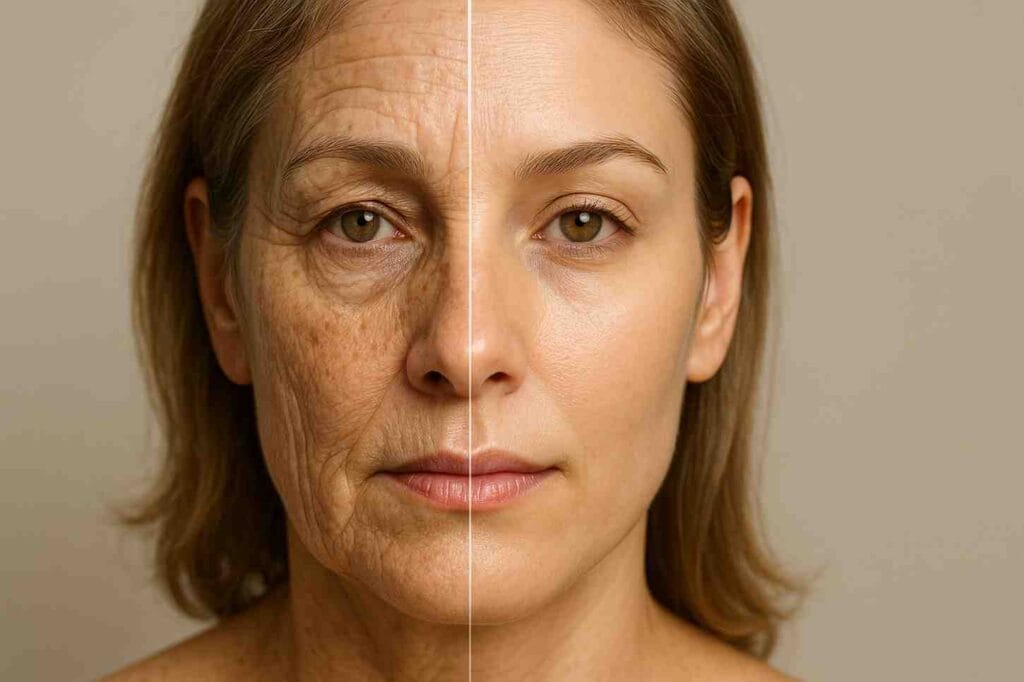
Discover the real science behind aging the skin, what accelerates the process, what causes it, and what techniques approved experts recommend to preserve youthful-looking skin longer.
Wrinkling is not the only aspect of skin aging. It is a biological, gradual process affected by numerous internal and external factors. Although we cannot control time, understanding the physiological changes that occur in the skin as we age can help delay the process, without relying on false promises of miraculous creams and deception.
Let’s explore what the science says.
How Does Aging Affect Your Skin?
Your largest organ is your skin. It also undergoes modifications throughout time, just like any other organ. However, aging skin experiences certain changes rather than simply “getting old”:
- The decline of collagen and elastin: These proteins maintain the firmness and elasticity of skin. We lose around 1% of our collagen annually after the age of 20. [1]
- Thinner epidermis: resulting in the outermost layer being more delicate.
- Reduced oil production: The skin gets flakier and drier.
- Slower cell turnover: Dullness results from dead skin cells remaining on the surface for longer periods.
- Hyperpigmentation: Uneven tone and sun spots begin to appear.
- Capillary fragility: Skin bruises more easily.
But why does all of this occur?
The Real Skin Aging Causes (Not Just Age)
Two processes fuel skin aging:
| Type of Aging | Key Triggers | Can You Control It? |
| Intrinsic Aging | Genetics, hormonal decline, metabolic slowdown | ❌ Not really |
| Extrinsic Aging | UV rays, pollution, smoking, poor skincare, and diet | ✅ Yes, to a large extent |
1. Sun Exposure (Photoaging):
The first external factor of premature aging of the skin is UV radiation. It degrades collagen, creates DNA destruction, and induces inflammation. UV exposure contributes as much as 80 percent to the aging of the face.[2]
2. Pollution
Airborne toxins generate free radicals that stress the skin barrier, increasing fine lines and pigmentation.
3. Smoking
Nicotine reduces oxygen supply to the skin. Smoking also destroys collagen, accelerating wrinkles—especially around the mouth.
4. Poor Nutrition
Diets high in sugar and processed food increase glycation, a process that stiffens collagen fibers. Nutrient deficiencies (like vitamins C and E) reduce your skin’s repair abilities.
5. Lack of Sleep and Chronic Stress
Both interfere with skin repair, increase cortisol levels, and degrade collagen over time.
Signs of Skin Aging You Shouldn’t Ignore
- Crow’s feet around the eyes
- Smile lines that stay even when you’re not smiling
- Uneven texture or tone
- Age spots or dark patches
- Sagging jawline
- Dry, crepey skin (especially on the neck and hands)
Can You Reverse Skin Aging? Here’s What Actually Helps
Total reversal? No. But slowing it down or softening signs? Absolutely—if you focus on what’s backed by science.
1. Sunscreen Every Single Day
Broad-spectrum SPF 30+ is your first defense. Even on cloudy days or indoors, UVA rays still age your skin.
Fact: Daily sunscreen can reverse some signs of photoaging over time.[3]
2. Topical Retinoids (Retinol or Tretinoin)
Vitamin A derivatives speed up cell turnover and stimulate collagen production. They remain the gold standard in anti-aging skincare.
3. Antioxidants (Vitamin C, Niacinamide, CoQ10)
These neutralize free radicals and brighten skin tone. Use them in serums, ideally in the morning under SPF.
4. Peptides and Growth Factors
They signal your skin to rebuild. While results take time, clinical studies show improved firmness and elasticity.
5. Moisturizers with Ceramides and Hyaluronic Acid
Hydration plumps up fine lines and strengthens the barrier function of aging skin.
6. In-Office Treatments
Options like microneedling, lasers, and chemical peels trigger controlled injury to stimulate repair and collagen growth—when done correctly.
Natural Ways to Support Youthful Skin
1. Eat for Your Skin
A skin-friendly diet includes:
- Vitamin C: Citrus, bell peppers
- Vitamin E: Nuts, seeds, spinach
- Omega-3s: Fatty fish, chia seeds
- Polyphenols: Green tea, berries
Avoid high-sugar, high-glycemic foods—they accelerate skin aging via glycation.
2. Stay Hydrated
Water helps maintain skin elasticity. Dehydrated skin looks older—even if you’re young.
3. Manage Stress
Stress ages skin from the inside out. Techniques like breathwork, yoga, or even short walks reduce cortisol levels and improve circulation.
Myths to Stop Believing
- “Natural products are always better.” Not true. Poison ivy is natural. Retinol is synthetic and effective.
- “You don’t need sunscreen indoors.” UVA rays penetrate windows.
- “Expensive skincare means better results.” Many drugstore products use the same active ingredients.
A Daily Skin Routine That Works (and Doesn’t Take Hours)
| Step | Morning | Night |
| Cleanser | Gentle, non-stripping | Double cleanse if wearing SPF/makeup |
| Treatment | Antioxidant serum (Vitamin C) | Retinol or exfoliant (alternate nights) |
| Moisturizer | Lightweight, hydrating | Richer formula with ceramides |
| Sunscreen | Broad-spectrum SPF 30+ | — |
Final Thoughts
Skin aging is natural—but how fast and how visibly it happens is largely within your control. The earlier you adopt smart skincare and healthy lifestyle habits, the more graceful the journey.
Instead of chasing “anti-aging,” think of it as pro-aging well. Protect what you have, repair what you can, and let your skin reflect your health—not your stress.
FAQs
Q. At what age should you start anti-aging skincare?
Ideally, in your 20s, prevention is more effective than correction.
Q. Are collagen supplements effective?
Some studies suggest they may improve skin elasticity, but results vary. Always choose hydrolyzed collagen peptides from trusted sources.
Q. Can drinking water reduce wrinkles?
Not directly, but staying hydrated does keep skin plump and improves barrier function.
Q. How often should you exfoliate aging skin?
1–2 times per week is enough. Over-exfoliation can damage mature skin.